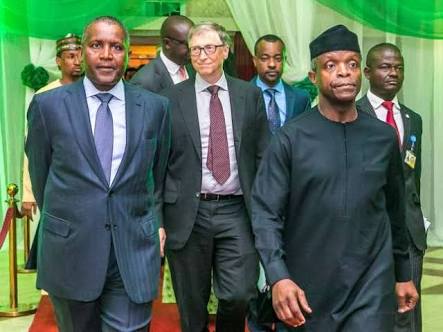One of the world’s richest men, Bill Gates has harped on the need for Nigeria to invest in its human capital.
Gates,
who stressed that Nigeria has unmatched economic potential, said growth
would come naturally when Nigeria maximises its greatest resource – the
people.
He spoke yesterday at the expanded
National Economic Council (NEC) meeting chaired by Vice President Yemi
Osinbajo at the old Banquet Hall of the State House, Abuja.
The multi-billionaire and Aliko Dangote also visited the Emergency Operations Centre for polio in Abuja.
Gates,
whose foundation has invested more than $1.6 billion in Nigeria to
date, is in the country to see first-hand the progress in primary
healthcare provision, polio eradication, nutrition and financial
inclusion.
He said: “The Nigerian government’s Economic Recovery
and Growth Plan identifies ‘investing in our people’ as one of three
‘strategic objectives. But the ‘execution priorities’ don’t fully
reflect people’s needs, prioritising physical capital over human
capital.
“To anchor the economy over the long term, investments
in infrastructure and competitiveness must go hand in hand with
investments in people.
“People without roads, ports, and
factories can’t flourish. And roads, ports and factories without skilled
workers to build and manage them can’t sustain an economy.”
Gates urged political leaders to maximise the country’s resources which are its people as a way to help it to thrive.
He
said: “But growth is not inevitable. Nigeria has unmatched economic
potential, but what becomes of that potential depends on the choices you
make as Nigeria’s leaders.
“The most important choice you can
make is to maximise your greatest resources, the Nigerian people.
Nigeria will thrive when every Nigerian is able to thrive.
“If
you invest in health, education, and opportunities – the ‘human capital’
we are talking about today – then they will lay the foundation for
sustained prosperity. If you don’t, however, then it is very important
to recognise that there will be a sharp limit on how much the country
can grow.”
Gates added: “You see this risk in the data. From the
point of view of the quality of life, much of Nigeria still looks like a
low-income country. Let me give a few examples.
“In the middle
income countries, the average life expectancy is 75 years. In lower
middle income countries, it’s 68. In low income countries, it’s 62. In
Nigeria, it is lower still: just 53 years.
“Nigeria is one of the
most dangerous places in the world to give birth, with the fourth worst
maternal mortality rate in the world, ahead of only Sierra Leone,
Central African Republic, and Chad.
“One in three Nigerian
children is chronically malnourished. I do not enjoy speaking to you
this bluntly when you have been gracious enough to invite me here. But I
am applying an important lesson I earned from Alhaji Aliko Dangote.”
Noting
that his foundation with the largest headquarters in Africa is sited in
Nigeria, he said that he has also committed the sum of $1.6 billion in
Nigeria with a plan to increase the amount.
Making a PowerPoint
presentation of a model of the trajectory of Nigeria’s economic growth,
relating to health and education, Gates observed that if the present
trend continues, Nigeria cannot keep up with its population growth.






